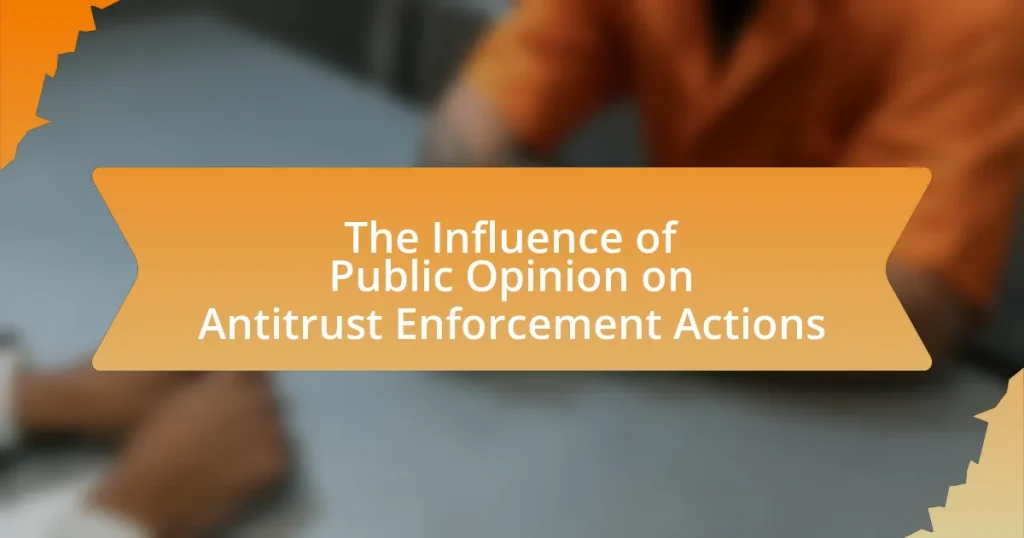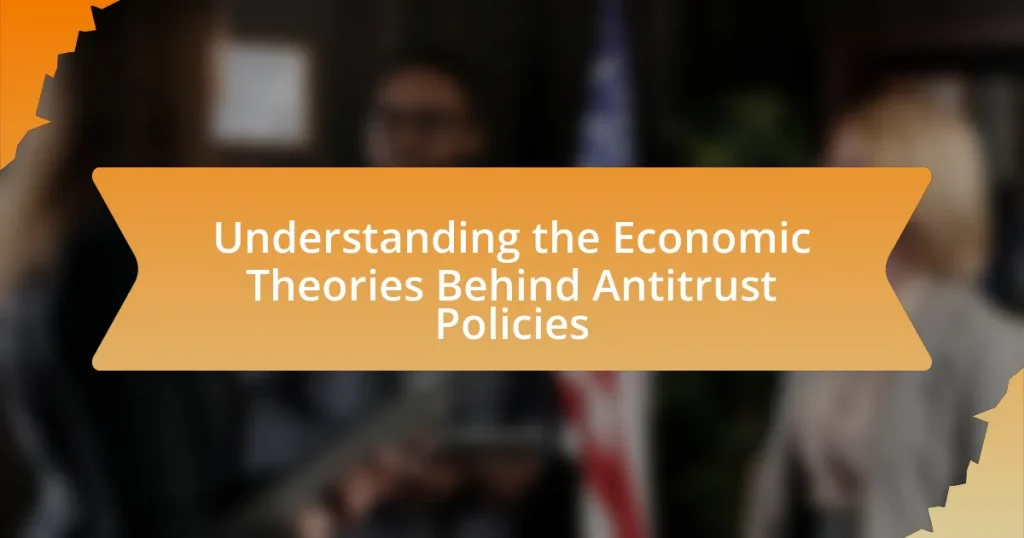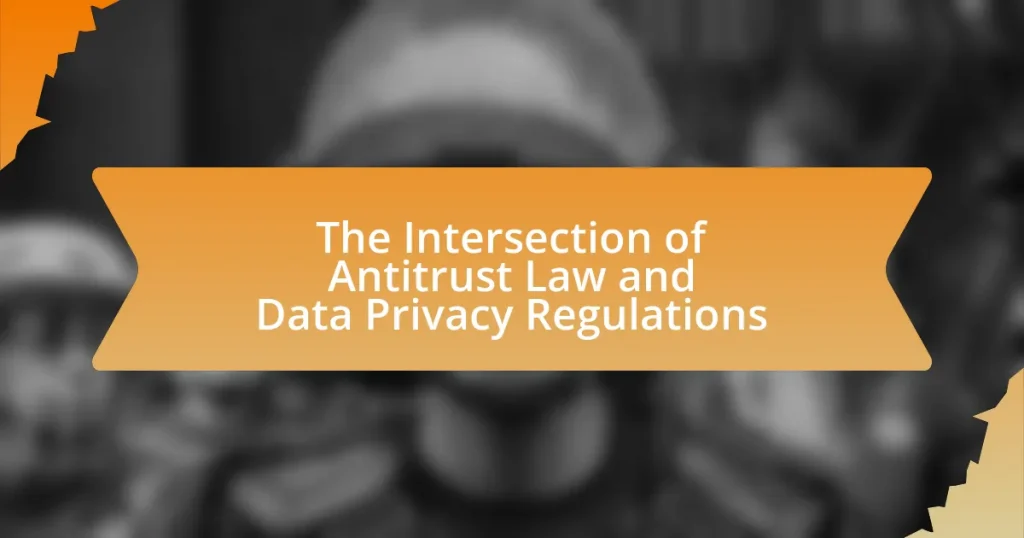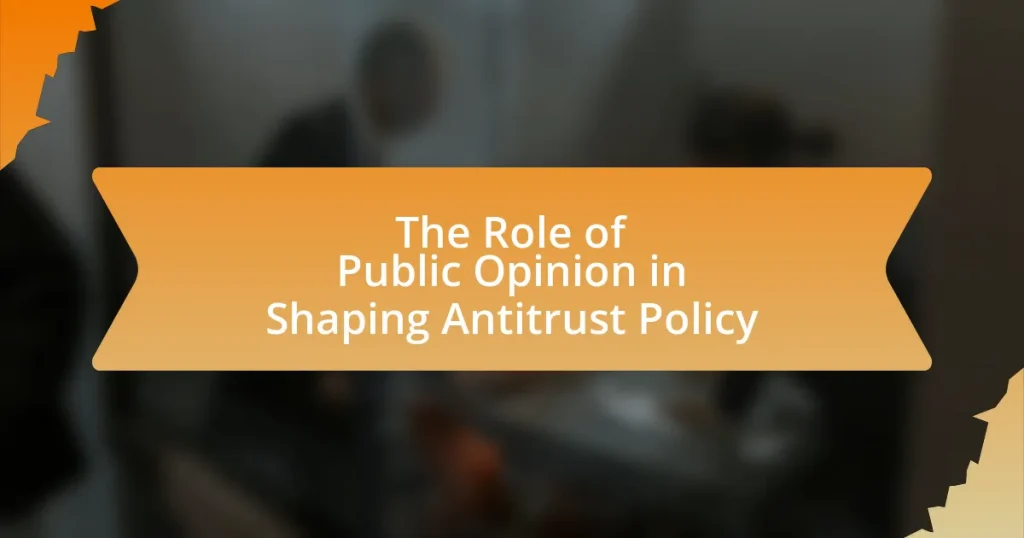The article examines the significant influence of public opinion on antitrust enforcement actions, highlighting how societal attitudes shape the priorities and strategies of regulatory agencies such as the Federal Trade Commission and the Department of Justice. It discusses the historical context of public sentiment driving regulatory scrutiny, particularly in high-profile cases involving large corporations like Microsoft, Google, and Facebook. The article also explores the role of public advocacy, media coverage, and social media in shaping perceptions of monopolistic practices, as well as the challenges regulators face in aligning public opinion with legal frameworks. Ultimately, it emphasizes the importance of transparency and public engagement in fostering trust and effective antitrust enforcement.
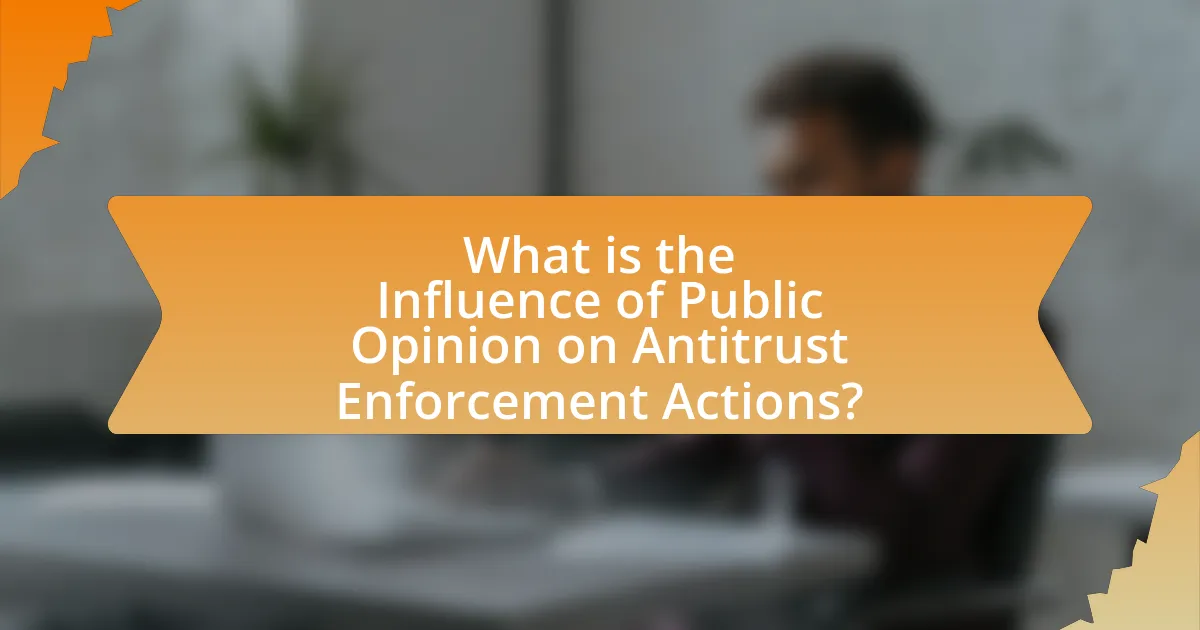
What is the Influence of Public Opinion on Antitrust Enforcement Actions?
Public opinion significantly influences antitrust enforcement actions by shaping the priorities and strategies of regulatory agencies. When public sentiment leans toward skepticism of large corporations, agencies like the Federal Trade Commission and the Department of Justice may feel pressured to pursue more aggressive enforcement actions against perceived monopolistic behaviors. For instance, in the late 1990s, public concern over the dominance of Microsoft led to a landmark antitrust case, reflecting how public opinion can catalyze regulatory scrutiny. Additionally, surveys indicate that a majority of Americans support stricter antitrust laws, which can prompt lawmakers to advocate for enhanced enforcement measures. This interplay between public sentiment and regulatory action underscores the importance of societal attitudes in shaping antitrust policy.
How does public opinion shape antitrust policies?
Public opinion significantly shapes antitrust policies by influencing lawmakers and regulatory agencies to prioritize consumer interests and market fairness. When public sentiment leans towards concerns about monopolistic practices or corporate power, policymakers often respond by enacting stricter antitrust regulations or increasing enforcement actions. For instance, the rise of public backlash against large tech companies in the late 2010s led to renewed scrutiny and calls for antitrust investigations, as seen in the cases against Google and Facebook. This demonstrates that public opinion can directly impact the legislative agenda and the enforcement priorities of antitrust authorities, ultimately shaping the regulatory landscape.
What role does public sentiment play in regulatory decisions?
Public sentiment significantly influences regulatory decisions by shaping the priorities and actions of policymakers. Regulatory agencies often consider public opinion to maintain legitimacy and ensure compliance with societal values. For instance, in antitrust enforcement, public outcry against monopolistic practices can prompt regulators to take action, as seen in the increased scrutiny of large tech companies in response to widespread concerns about market dominance and consumer rights. This responsiveness to public sentiment is evident in historical cases, such as the breakup of AT&T in the 1980s, which was partly driven by public dissatisfaction with high prices and limited competition.
How do public perceptions of monopolies influence enforcement actions?
Public perceptions of monopolies significantly influence enforcement actions by shaping regulatory priorities and the political climate surrounding antitrust issues. When the public views monopolies negatively, it creates pressure on government agencies to take action against perceived anti-competitive practices. For instance, high-profile cases like the antitrust actions against Microsoft in the late 1990s were fueled by public concern over the company’s market dominance and its impact on consumer choice. This public sentiment can lead to increased scrutiny from regulators, as seen in recent years with growing calls for action against large tech companies like Google and Facebook, where public outcry over data privacy and market control has prompted investigations and legislative proposals.
Why is public opinion important in antitrust enforcement?
Public opinion is important in antitrust enforcement because it shapes regulatory priorities and influences the actions of policymakers. When the public perceives monopolistic practices or anti-competitive behavior, it can lead to increased scrutiny and pressure on regulatory bodies to take action. For instance, high-profile cases like the breakup of AT&T in the 1980s were partly driven by public concern over monopolistic practices, demonstrating how public sentiment can catalyze enforcement actions. Additionally, public opinion can affect the political landscape, as elected officials often respond to constituents’ views to maintain support, thereby impacting the enforcement of antitrust laws.
What impact does public advocacy have on antitrust investigations?
Public advocacy significantly influences antitrust investigations by shaping public perception and pressuring regulatory bodies to act. When advocacy groups mobilize public opinion against perceived anti-competitive practices, they can lead to increased scrutiny from agencies like the Federal Trade Commission and the Department of Justice. For instance, high-profile campaigns against companies such as Google and Facebook have resulted in formal investigations and legal actions, demonstrating how public sentiment can catalyze regulatory responses. Additionally, public advocacy can inform policymakers about consumer concerns, ultimately guiding the enforcement priorities of antitrust authorities.
How can public opinion lead to changes in antitrust laws?
Public opinion can lead to changes in antitrust laws by influencing policymakers and regulators to address perceived market injustices. When a significant portion of the public expresses concern over monopolistic practices or anti-competitive behavior, elected officials may respond by advocating for stricter antitrust regulations. For example, the rise of public sentiment against large technology companies in the late 2010s prompted discussions in Congress about updating antitrust laws to better regulate digital markets. This shift in public opinion was reflected in various surveys indicating that a majority of Americans believed that big tech companies held too much power, leading to increased scrutiny and legislative proposals aimed at reforming antitrust enforcement.
What are the historical examples of public opinion affecting antitrust actions?
Public opinion has historically influenced antitrust actions, notably during the early 20th century with the breakup of Standard Oil in 1911. The public’s growing concern over monopolistic practices and the negative impact on consumers led to increased scrutiny and legal action against the company. Additionally, the 1950s and 1960s saw public sentiment against corporate consolidation, which contributed to the enforcement of antitrust laws against companies like American Telephone and Telegraph (AT&T), resulting in its breakup in 1982. These examples illustrate how public opinion can drive regulatory actions aimed at promoting competition and protecting consumer interests.
Which landmark cases were influenced by public sentiment?
Landmark cases influenced by public sentiment include Brown v. Board of Education (1954), Roe v. Wade (1973), and United States v. Microsoft Corp. (2001). Brown v. Board of Education was significantly shaped by the civil rights movement, reflecting widespread public demand for desegregation in schools. Roe v. Wade emerged from a growing public discourse on women’s rights and reproductive freedom, leading to a landmark decision that legalized abortion. United States v. Microsoft Corp. was influenced by public concern over monopolistic practices in the tech industry, which prompted government action against Microsoft for antitrust violations. These cases illustrate how public sentiment can drive legal outcomes and shape judicial decisions.
How did public campaigns shape the outcomes of these cases?
Public campaigns significantly influenced the outcomes of antitrust enforcement actions by mobilizing public opinion and pressuring regulatory bodies. For instance, the campaign against Microsoft in the late 1990s galvanized consumer sentiment and led to heightened scrutiny from the Department of Justice, resulting in a landmark settlement that imposed restrictions on Microsoft’s business practices. Similarly, public outcry over the merger between AT&T and Time Warner prompted regulators to reconsider the implications of such consolidations on competition and consumer choice, ultimately leading to a more rigorous review process. These examples illustrate how organized public campaigns can shift the focus of regulatory agencies and alter the trajectory of antitrust cases.
How does media coverage affect public opinion on antitrust issues?
Media coverage significantly shapes public opinion on antitrust issues by framing the narrative around corporate behavior and market competition. When media outlets highlight monopolistic practices or anti-competitive behavior, they raise awareness and concern among the public, which can lead to increased support for regulatory actions. For instance, a study by the Pew Research Center found that 62% of Americans believe that large corporations have too much power, a sentiment often amplified by investigative journalism that exposes corporate malfeasance. This coverage can mobilize public sentiment, influencing policymakers to prioritize antitrust enforcement in response to public demand for fair competition.
What role does social media play in shaping public perceptions?
Social media significantly shapes public perceptions by facilitating the rapid dissemination of information and enabling user engagement. Platforms like Twitter and Facebook allow individuals to share opinions, news, and experiences, which can influence collective attitudes and beliefs. Research indicates that social media can amplify certain narratives, as seen in the 2016 U.S. presidential election, where misinformation spread rapidly, affecting voter perceptions and decisions. Additionally, studies show that social media interactions can create echo chambers, reinforcing existing beliefs and biases, which further impacts public opinion on various issues, including antitrust enforcement actions.
How do news narratives influence regulatory focus?
News narratives significantly influence regulatory focus by shaping public perception and framing issues in a way that prioritizes certain regulatory actions over others. For instance, when media coverage emphasizes monopolistic practices of large corporations, it can lead to increased public concern and pressure on regulators to take action against those entities. Research indicates that heightened media attention correlates with a rise in regulatory scrutiny, as seen in the case of antitrust actions against tech giants like Google and Facebook, where extensive news coverage prompted lawmakers to prioritize investigations and legislative reforms. This demonstrates that the framing of news narratives directly impacts the regulatory agenda by aligning it with public sentiment and perceived urgency.
What are the challenges of aligning public opinion with antitrust enforcement?
Aligning public opinion with antitrust enforcement faces significant challenges due to varying perceptions of market competition and consumer welfare. Public understanding of antitrust issues is often limited, leading to misconceptions about the role and impact of enforcement actions. For instance, a survey by the American Antitrust Institute revealed that only 30% of respondents could accurately define antitrust laws, indicating a knowledge gap that complicates public support for enforcement measures. Additionally, the influence of corporate lobbying can skew public perception, as businesses often frame antitrust actions as detrimental to innovation and economic growth, further complicating the alignment of public opinion with enforcement objectives.
How can conflicting public opinions complicate enforcement actions?
Conflicting public opinions can complicate enforcement actions by creating pressure on regulatory bodies to align their decisions with popular sentiment rather than legal standards. When public opinion is divided, enforcement agencies may face challenges in justifying their actions, leading to potential delays or alterations in enforcement strategies. For instance, if a significant portion of the public supports a merger while another opposes it, the agency may struggle to take decisive action, fearing backlash or loss of credibility. This dynamic can result in inconsistent enforcement, as seen in cases where public sentiment influenced the outcomes of antitrust investigations, ultimately undermining the effectiveness of regulatory frameworks designed to maintain fair competition.
What are the risks of populism in antitrust policy?
The risks of populism in antitrust policy include the potential for overly aggressive enforcement actions that prioritize public sentiment over economic principles. This can lead to decisions that harm market efficiency, stifle innovation, and create uncertainty for businesses. For instance, populist movements may push for the breakup of large companies based on public outcry rather than sound economic analysis, as seen in historical cases like the antitrust actions against Microsoft in the late 1990s, which were driven by public perception rather than clear evidence of consumer harm. Such populist approaches can undermine the foundational goals of antitrust laws, which aim to promote competition and protect consumer welfare.
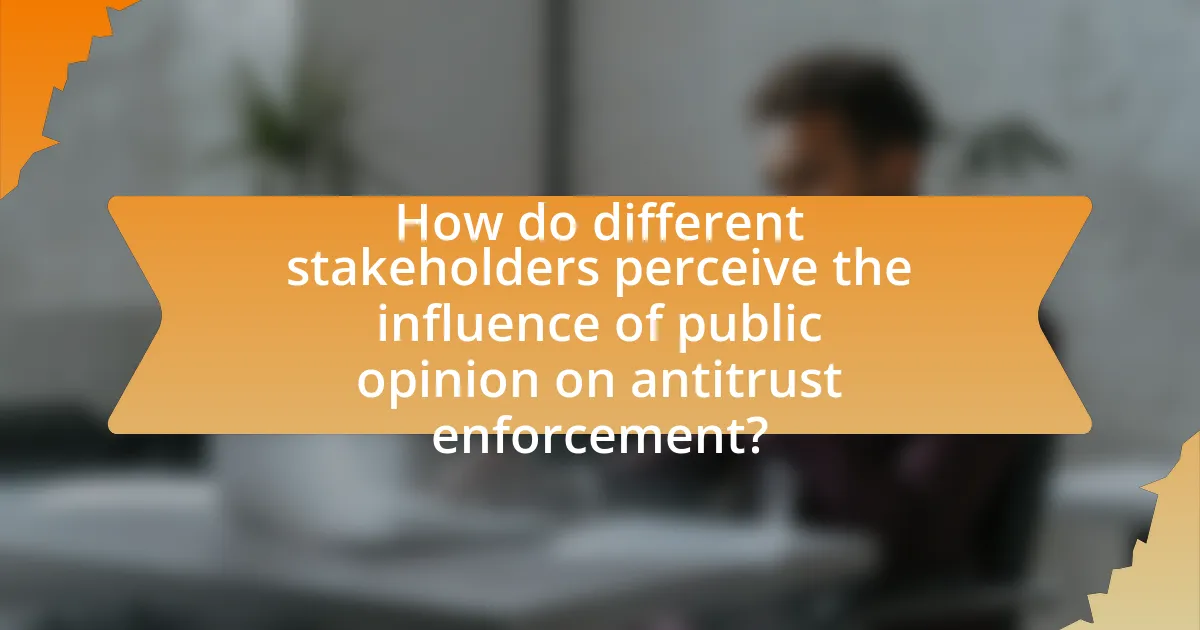
How do different stakeholders perceive the influence of public opinion on antitrust enforcement?
Different stakeholders perceive the influence of public opinion on antitrust enforcement as a significant factor that shapes regulatory actions and policy decisions. For instance, policymakers often view public sentiment as a barometer for the need to address monopolistic practices, leading to more aggressive enforcement when public concern is high. Business leaders, on the other hand, may perceive public opinion as a double-edged sword; while it can prompt necessary reforms, it can also lead to unpredictable regulatory scrutiny that affects market stability. Consumer advocacy groups typically believe that strong public opinion can empower regulators to take action against anti-competitive behavior, thereby enhancing market fairness. Academic research supports these perceptions, indicating that public opinion can sway antitrust enforcement outcomes, as seen in cases where consumer advocacy has led to increased scrutiny of large corporations.
What are the views of policymakers regarding public opinion?
Policymakers generally view public opinion as a critical factor influencing their decisions and actions, particularly in the realm of antitrust enforcement. They recognize that public sentiment can shape regulatory priorities and impact the perceived legitimacy of enforcement actions. For instance, studies have shown that heightened public concern over monopolistic practices can lead to increased scrutiny and more aggressive regulatory responses from agencies like the Federal Trade Commission. This responsiveness to public opinion is evident in historical cases where significant public outcry prompted policymakers to take action against large corporations, reflecting a direct correlation between public sentiment and regulatory behavior.
How do regulators balance public sentiment with legal frameworks?
Regulators balance public sentiment with legal frameworks by incorporating public opinion into the decision-making process while adhering to established laws and regulations. This involves conducting public consultations, gathering feedback through surveys, and analyzing social media trends to gauge public concerns and expectations. For instance, the Federal Trade Commission (FTC) often considers public input when evaluating mergers and acquisitions, ensuring that community perspectives are reflected in their assessments. By aligning regulatory actions with public sentiment, regulators can enhance transparency and accountability, ultimately fostering trust in the legal framework governing antitrust enforcement.
What strategies do policymakers use to gauge public opinion?
Policymakers use surveys, focus groups, and social media analysis to gauge public opinion. Surveys, such as those conducted by Gallup or Pew Research Center, provide quantitative data on public attitudes toward specific issues, allowing policymakers to identify trends and sentiments. Focus groups offer qualitative insights by facilitating discussions among diverse participants, revealing deeper motivations and concerns. Additionally, social media analysis enables policymakers to monitor real-time public discourse, capturing immediate reactions and sentiments regarding policies or events. These strategies collectively inform policymakers about public preferences and concerns, guiding their decisions in antitrust enforcement actions.
How do businesses respond to public opinion in antitrust matters?
Businesses respond to public opinion in antitrust matters by actively monitoring consumer sentiment and adjusting their strategies accordingly. For instance, when public concern arises over monopolistic practices, companies may implement changes to their pricing structures, enhance transparency in operations, or engage in public relations campaigns to improve their image. A notable example is the backlash faced by tech giants like Google and Facebook, which prompted them to adopt more user-friendly policies and increase their efforts in data privacy to align with public expectations. This responsiveness is crucial as negative public opinion can lead to increased scrutiny from regulators and potential legal challenges, thereby impacting a company’s market position and profitability.
What tactics do companies employ to manage public perception?
Companies employ various tactics to manage public perception, including strategic communication, social media engagement, and corporate social responsibility initiatives. Strategic communication involves crafting clear and consistent messages that align with the company’s values and goals, which helps shape public narratives. Social media engagement allows companies to interact directly with consumers, addressing concerns and promoting positive stories in real-time. Corporate social responsibility initiatives demonstrate a commitment to ethical practices and community involvement, which can enhance a company’s reputation. For instance, a 2020 survey by Edelman found that 68% of consumers believe that brands should take a stand on social issues, indicating that proactive engagement can significantly influence public perception.
How do businesses influence public opinion on antitrust issues?
Businesses influence public opinion on antitrust issues primarily through strategic communication and lobbying efforts. By engaging in public relations campaigns, companies can shape narratives around antitrust policies, emphasizing the potential negative impacts of regulation on innovation and consumer choice. For instance, major tech firms often argue that antitrust actions could stifle competition and lead to higher prices for consumers, which can resonate with the public’s concerns about market dynamics. Additionally, businesses may fund research or think tanks that produce studies supporting their viewpoints, thereby lending credibility to their arguments. This approach is evident in the lobbying expenditures of large corporations, which reached approximately $3.5 billion in 2020, highlighting their commitment to influencing legislative outcomes and public sentiment regarding antitrust enforcement.
What is the role of advocacy groups in shaping public opinion on antitrust enforcement?
Advocacy groups play a crucial role in shaping public opinion on antitrust enforcement by raising awareness about monopolistic practices and promoting the importance of competition. These organizations often conduct research, publish reports, and engage in public campaigns to highlight the negative impacts of anti-competitive behavior on consumers and the economy. For instance, groups like the American Antitrust Institute have been instrumental in advocating for stronger antitrust laws and policies, influencing both public sentiment and legislative action. Their efforts can lead to increased public scrutiny of large corporations, ultimately pressuring policymakers to take action against anti-competitive practices.
How do these groups mobilize public support for antitrust actions?
Groups mobilize public support for antitrust actions by leveraging grassroots campaigns, social media outreach, and strategic partnerships. These organizations often create awareness through educational initiatives that highlight the negative impacts of monopolistic practices on consumers and small businesses. For instance, campaigns may utilize data showing that increased market concentration leads to higher prices and reduced innovation, effectively illustrating the need for antitrust enforcement. Additionally, they engage in lobbying efforts to influence policymakers, using public petitions and demonstrations to showcase widespread public concern. Research indicates that public sentiment can significantly sway legislative action, as seen in the increased support for antitrust measures during periods of economic inequality.
What strategies do advocacy groups use to influence policymakers?
Advocacy groups use several strategies to influence policymakers, including lobbying, grassroots mobilization, and public campaigns. Lobbying involves direct interaction with legislators to persuade them on specific issues, often supported by research and data to strengthen their arguments. Grassroots mobilization engages the public to create a groundswell of support, encouraging constituents to contact their representatives, thereby amplifying the group’s message. Public campaigns utilize media and social platforms to raise awareness and shape public opinion, which can pressure policymakers to act in favor of the advocacy group’s goals. For instance, the American Civil Liberties Union (ACLU) has effectively used these strategies to influence legislation on civil rights issues, demonstrating the impact of organized advocacy efforts on policymaking.
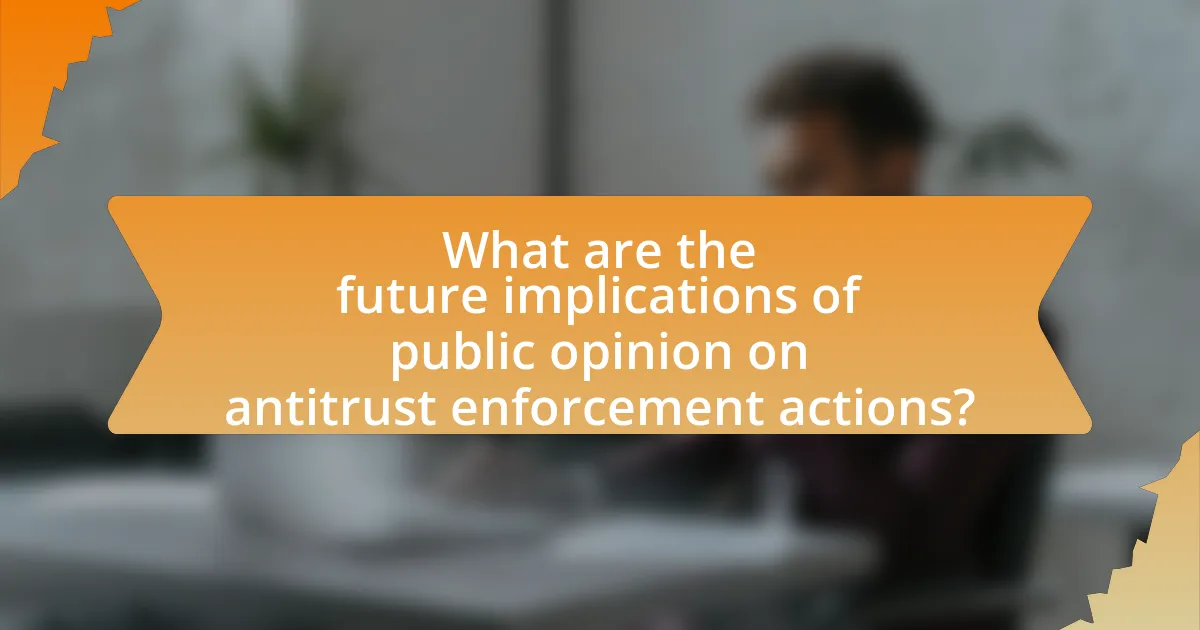
What are the future implications of public opinion on antitrust enforcement actions?
Public opinion will increasingly shape antitrust enforcement actions by influencing policymakers and regulatory agencies to prioritize consumer interests and market fairness. As public awareness of monopolistic practices grows, there is a heightened demand for accountability from large corporations, which can lead to more rigorous investigations and enforcement of antitrust laws. Historical trends, such as the public backlash against tech giants like Facebook and Google, demonstrate that consumer sentiment can prompt legislative changes and increased scrutiny, ultimately resulting in more aggressive antitrust actions. This shift indicates that regulators may adopt a more proactive stance in response to public concerns, reflecting a broader societal push for equitable market practices.
How might evolving public attitudes impact future antitrust policies?
Evolving public attitudes may lead to more stringent antitrust policies as societal concerns about monopolistic practices and corporate power increase. For instance, growing public awareness of issues like income inequality and corporate influence in politics has prompted calls for stronger regulatory frameworks. A 2021 Pew Research Center survey indicated that 60% of Americans believe that large corporations have too much power, suggesting a shift in public sentiment that could pressure lawmakers to adopt more aggressive antitrust measures. This shift may result in policies that prioritize consumer welfare and market competition, reflecting the public’s demand for accountability and fairness in the marketplace.
What trends are emerging in public opinion regarding monopolistic practices?
Emerging trends in public opinion regarding monopolistic practices indicate a growing concern about the power and influence of large corporations. Recent surveys show that a significant majority of the public believes that monopolistic practices harm competition and consumer choice, with 70% of respondents in a 2023 Pew Research Center study expressing the need for stricter regulations on big tech companies. Additionally, there is increasing support for antitrust actions, as evidenced by a 2022 Gallup poll revealing that 61% of Americans favor breaking up large companies perceived as monopolies. This shift in public sentiment is influencing policymakers to consider more aggressive antitrust enforcement to address perceived abuses of market power.
How can technology influence public perceptions of antitrust issues?
Technology can significantly influence public perceptions of antitrust issues by shaping the way information is disseminated and consumed. Social media platforms and online news outlets enable rapid sharing of opinions and analyses regarding antitrust cases, which can sway public sentiment. For instance, high-profile antitrust investigations, such as those involving major tech companies like Google and Facebook, often generate extensive online discourse, leading to heightened awareness and varying interpretations of the implications of these cases. Research indicates that public opinion can be swayed by the framing of these issues in digital media, as seen in studies showing that narratives emphasizing consumer harm or corporate power can lead to increased support for regulatory actions.
What best practices can regulators adopt to align with public opinion?
Regulators can adopt best practices such as conducting regular public consultations and utilizing transparent communication strategies to align with public opinion. Regular public consultations allow regulators to gather diverse perspectives and understand community concerns, which can inform policy decisions. For instance, the Federal Trade Commission (FTC) has engaged in public workshops to discuss antitrust issues, demonstrating responsiveness to public sentiment. Transparent communication strategies, including clear reporting on regulatory actions and their rationale, help build trust and ensure that the public feels informed and involved in the regulatory process. This approach is supported by research indicating that transparency enhances public trust in regulatory bodies, ultimately leading to more effective enforcement actions.
How can transparency improve public trust in antitrust enforcement?
Transparency can improve public trust in antitrust enforcement by providing clear information about the processes and decisions involved in enforcement actions. When regulatory bodies openly share data, methodologies, and the rationale behind their actions, it fosters a sense of accountability and reduces perceptions of bias or corruption. For instance, studies have shown that when the Federal Trade Commission publishes detailed reports on its investigations, public confidence in its impartiality increases, as evidenced by a 2019 survey indicating that 70% of respondents felt more assured about antitrust actions when transparency was prioritized. This openness not only enhances the legitimacy of enforcement efforts but also encourages public engagement and support for regulatory initiatives.
What methods can regulators use to effectively engage with the public?
Regulators can effectively engage with the public through methods such as public consultations, social media outreach, and educational campaigns. Public consultations allow regulators to gather feedback directly from citizens, ensuring that diverse perspectives are considered in decision-making processes. Social media outreach enables regulators to disseminate information quickly and interactively, fostering a two-way communication channel that can enhance transparency and trust. Educational campaigns can inform the public about antitrust issues, helping to raise awareness and understanding of regulatory actions. These methods have been shown to increase public participation and improve the legitimacy of regulatory decisions, as evidenced by studies indicating that inclusive engagement leads to more informed and accepted policies.
